—Nettie Liburt, PhD., PAS of BUCKEYE™ Nutrition
We often focus on training, strength, and nutrition to support optimum performance in our equine athletes. And rightly so! But equally important to training is recovery. In human exercise physiology, working in days of stretching, yoga, or light movement after strenuous exercise, along with a supportive balanced nutrition program, is critical to support performance and recovery, and horses are no different. In response to this need, BUCKEYE™ Nutrition has developed a unique supplement to help your performance horse recover—ULTIMATE RECOVERY™! Formulated by PhD and MS equine nutritionists, BUCKEYE’s ULTIMATE RECOVERY provides an ideal blend of amino acids, including branched-chain amino acids, essential for muscle recovery and energy synthesis, energy sources, electrolytes, and pre- and probiotics to help get your horse ready for the next training session or competition. With a low feeding rate, ULTIMATE RECOVERY can easily be top-dressed onto any feed, plus, one bag can last a month or more! How’d we do it? Read on!
Glycogen Replenishment
Glucose is stored in the muscle and liver in the form of glycogen. Glycogen is a ready-to-burn fuel that is used for getting going (think bursting out of the starting gate or clearing a jump.) But glycogen reserves can be burned up very quickly (within a few minutes of intense work). Horses participating in a long day of competition, or competition on successive days, can run out of this fuel source if not given time to recover and replenish.
Glycogen replenishment occurs when food consumed (specifically carbohydrates) is converted to glycogen and stored, and this is a very slow process in horses. In humans, glycogen replenishment may occur within a few hours, however, in horses, it’s more likely to take a few days. You can’t “carb load” a horse the same way many human athletes do. However, you can provide a balanced diet that offers an appropriate carbohydrate concentration to help rebuild the supply of glycogen for your equine athlete.
ULTIMATE RECOVERY provides about 23% non-structural carbohydrates (NSC, equivalent to starch + sugar) per pound to help this process. In addition, research (Waller, et al., 2009) has suggested that electrolytes may aid in glycogen replenishment, facilitating the recovery process after exercise. BUCKEYE Nutrition’s university researched and formulated electrolyte, PERFORM ‘N WIN™, can be top-dressed to support additional hydration when necessary.
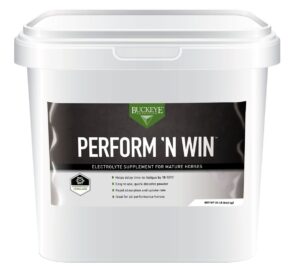
Protein
ULTIMATE RECOVERY supplies a minimum of 18% crude protein per pound. Protein is made of building blocks called amino acids. Some amino acids can be made by the body, and others, called essential amino acids (EAAs), must be consumed in the diet. Exercise increases the dietary protein requirement to support muscle building, energy and repair. The “big 3” EAAs include lysine, methionine, and threonine, without which no muscle can develop or repair. Soybean meal is one of the best sources of these EAAs. In addition, branched-chain amino acids (BCAAs) are also EAAs, and include leucine, isoleucine, and valine. BCAAs play a key role in muscle energy maintenance and are involved in protein synthesis. Whey protein can be included in the diet as a rich source of BCAAs. ULTIMATE RECOVERY contains more research-proven concentrations of BCAA’s (Stefanon et al., 2000) than any other performance supplement on the market. High-quality protein sources, such as soybeans and whey, provide essential amino acids in ULTIMATE RECOVERY for recovery and repair of muscle after exercise.
Rehydration
Electrolytes are an important ingredient in ULTIMATE RECOVERY. Like humans, horses sweat to facilitate the process of cooling the body off. Horse sweat is highly concentrated with electrolytes, more so than human sweat is. You’ve probably noticed that your own sweat is salty – a horse’s sweat is even saltier! Because water follows salt (sodium chloride), heavy sweating not only means water loss, but loss of electrolytes like sodium, chloride, potassium, calcium, and others. Sweat losses can be exacerbated under hot, humid conditions.
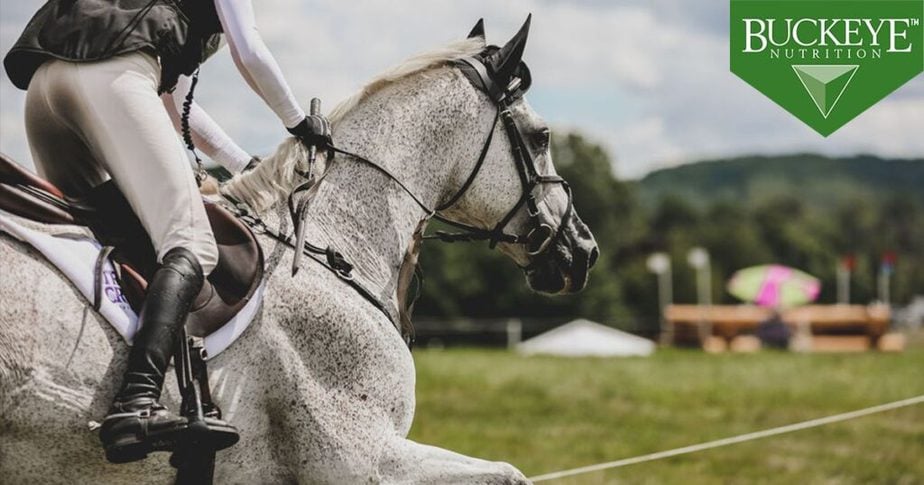
Why does this matter? When a horse sweats and electrolytes, like salt, leave the body, so does water. Water evaporation from the skin helps to cool the horse’s body during work, which is normal. During exercise recovery, electrolytes and water need to be replaced for proper rehydration to occur. A dehydrated horse cannot effectively regulate body temperature, and muscle function and performance will also be impaired if electrolytes are out of balance or insufficiently available. But again, because water follows salt, when salt and electrolytes are consumed, it helps to drive the thirst response to help replenish water in the body.
The body does not store electrolytes, yet electrolyte concentration in the body is very tightly regulated. Whatever isn’t needed will be excreted in the urine. Proper concentrations of electrolytes are critical for muscles to contract and relax normally. In horses that become severely dehydrated, muscle cramping can be a problem. After a heavy session of training and sweating, it may be advisable to top-dress electrolytes in the horse’s feed, or mixed in a water bucket (note that if mixed with water, be sure to offer a plain bucket of water as well in case the horse objects to flavor changes in water mixed with electrolytes.) Make sure the horse is drinking water because, without rehydrating with water, electrolytes can increase dehydration by drawing water out of circulation. Do not dose straight electrolytes to a severely dehydrated horse, as this may cause digestive upset. Instead, mix the electrolytes with feed or water.
Other Nutritional Considerations
Maintaining proper dietary intake of vitamin E supports muscle recovery, rebuilding and overall health. Vitamin E, a powerful antioxidant, serves to help defend and repair cellular damage that occurs during exercise. ULTIMATE RECOVERY contains a minimum of 200 IU vitamin E per pound, about 20% of an average adult horse’s daily minimum requirement.
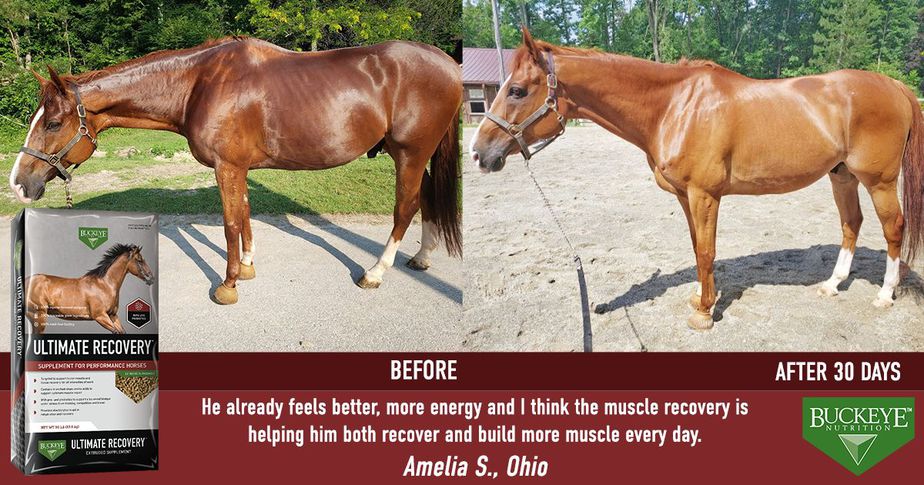
ULTIMATE RECOVERY also contains glutamine, an amino acid used for energy by cells in the digestive tract. Glutamine helps maintain the integrity of the intestinal barrier between cells, potentially helping to support overall gut health.
Keeping the digestive tract balanced is of utmost importance for all horses, especially those that travel, compete and train. Research has shown that even short trailer rides may disrupt the microbiome, and the longer the trip the more disruption may occur (Perry et al., 2018; Szemplinski, et al., 2020). In addition to a forage-based diet, dietary fibers that include things like beet pulp and even flaxseed are excellent fuel sources for the gut microbiome. A healthy microbiome will strengthen the immune system and be able to get the most out of dietary forage. In addition, while research on probiotics is limited, species of bacteria found in healthy hindguts are known. ULTIMATE RECOVERY includes bacteria from some Lactobacillus and Enterococcus strains, which are found in the healthy hindgut.
Active Recovery
Finally, not every day should be a hard training day. Active recovery that incorporates stretching or slow, low-intensity work (think relaxing trail ride, extra turnout or a walk around the farm) can do wonders for helping to work out sore muscles and help calm the mind. Horses need a change in pace and a chance to slow down just the same as their human athlete counterparts do, so don’t neglect recovery days.
Wrap-Up: All About Balance
A balanced diet is essential for the success of any equine athlete, from the steady school horse to the high-level competition horse. Dietary support with ULTIMATE RECOVERY will supply a balance of branched-chain amino acids, electrolytes, pre- and probiotics, and energy that will go a long way to help your equine athlete recover and be ready for optimal performance the next time. Try ULTIMATE RECOVERY by BUCKEYE Nutrition today! (Visit buckeyenutrition.com for more information).
Dr. Nettie Liburt is the Senior Equine Nutrition Manager at Mars Horsecare US/BUCKEYE™ Nutrition where she helps develop new products, trains associates in equine nutrition, and works with the company’s UK-based team at the WALTHAM® Centre for Pet Nutrition on developing and implementing research protocols. She holds Master’s and PhD degrees in Animal Science (Equine Nutrition & Exercise Physiology) from Rutgers University. Dr. Liburt is a member of the Equine Science Society, is a registered Professional Animal Scientist (PAS), and has an Appendix gelding named “ET” that she occasionally competes in the hunter and equitation divisions.



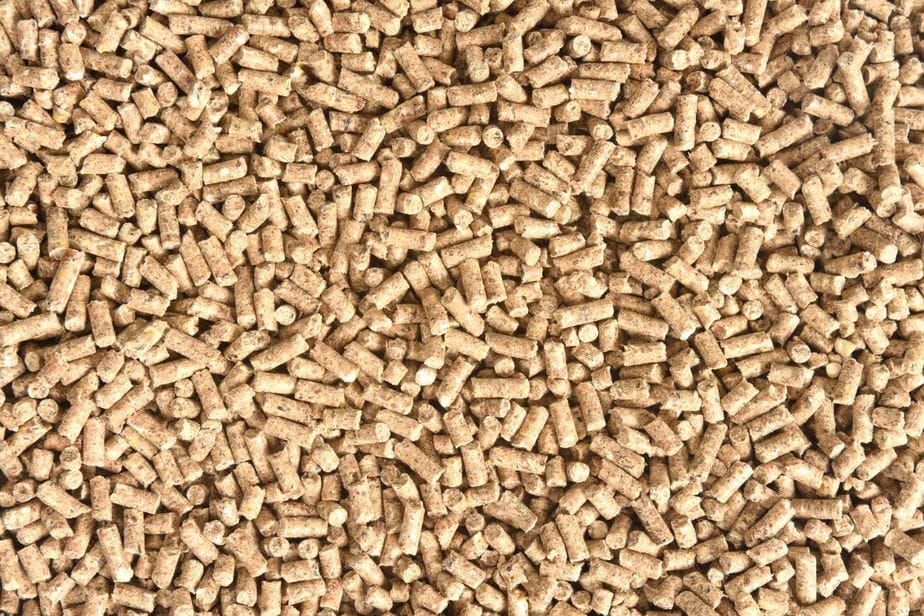
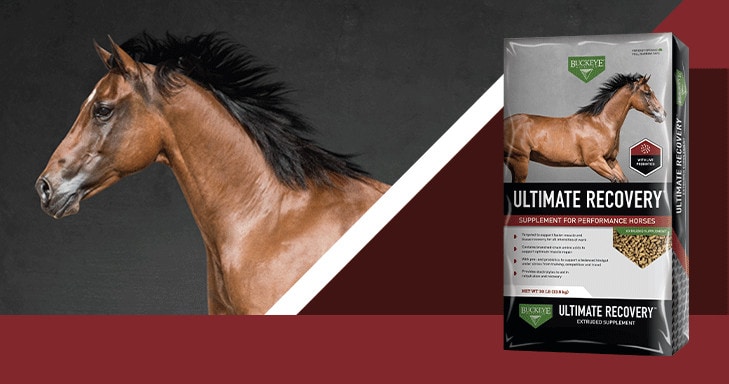

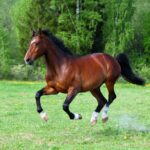
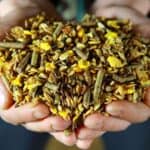
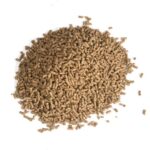

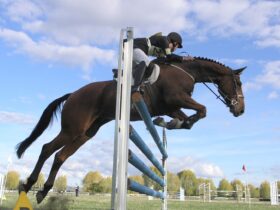
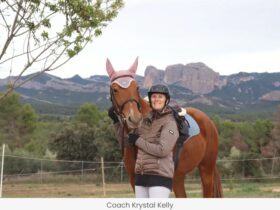
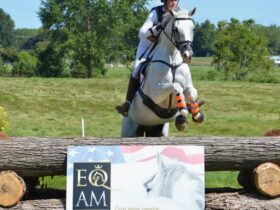
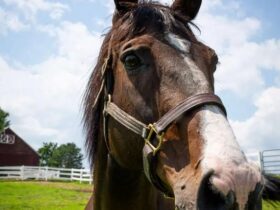
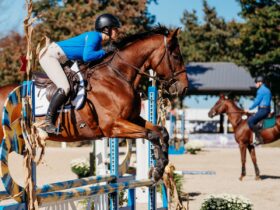


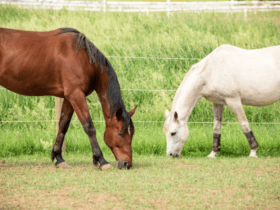




SOCIAL